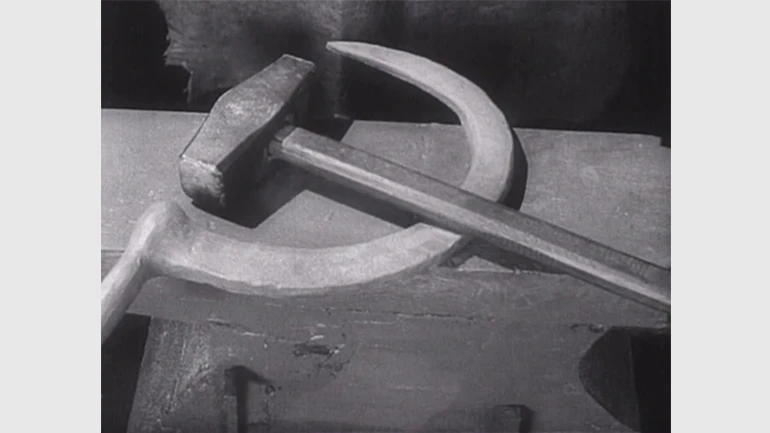
Held on 28 abr 2018
The coda to the activities conducted by Franco Berardi Bifo in the programme Six Contradictions and the End of the Present will feature a screening of the film Comunismo futuro (Future Communism), scripted and narrated by the Italian writer and directed by Andrea Gropplero di Troppenburg. Moreover, both will present the film and subsequently discuss it with the audience.
Bifo says of the film:
“It’s a lopsided film, like the times we live in. Comunismo futuro possesses different centres, making an unsteady, lopsided and off-kilter work, akin to the way contemporary humanity feels without communism.
One centre is 1917, a time in which the communist experiment was attempted under conditions that inevitably led to defeat and tragedy. Another centre is the apocalypse unleashed in recent times with the victory of Trumpian nazism in America and across a significant part of the world. A third centre is, finally, in Berkeley, California, on 2 December 1964, when five thousand students gathered on campus to listen to Mario Savio — leader of a freedom speech movement which grew impulsively — and were supposed to inform the university’s dean about the conversation.
There's a time when the operation of the machine becomes so odious, makes you so sick at heart that you can't take part! You can't even passively take part! And you've got to put your bodies upon the gears and upon the wheels… upon the levers, upon all the apparatus, and you've got to make it stop! And you've got to indicate to the people who run it, to the people who own it, that unless you're free the machine will be prevented from working at all!
That day was fifty-four years ago. The world has changed, moving in the direction Mario Savio foresaw with horror. The prescience of his words is striking and lucid in the relationship between knowledge and the capitalist economy, the process of submission and the privatisation of the university and research; a premonition in the destiny of the ’68 movement.
Mario Savio showed that the university is now becoming a company, an economic entity built primarily for profit. The relationship between power (military and economic) and knowledge was among the major concerns of students, researchers and intellectuals submerged in the movements around that time. Moreover, this relationship has become absolutely critical in the past three decades of the digital revolution. Mario Savio spoke of the sadness of exploited cognitive workers.
Savio finally invited his colleagues to block the levers, the gears and the wheels of the production apparatus to bring it to a halt. Yet this imagery – levers, wheels, gears, the factory, the old working class – stopped the ’68 movement from seeing the new landscape that was emerging before its eyes: the Net, digital technologies, cognitive and casual labour.
In the crowd that gathered in front of the main university in the Bay Area were thousands of young people listening, participating and breathing together, and indeed, many of them would become advocates for the process that led to the creation of the global network. We can imagine the faces of Steve Jobs or Steve Wozniak among the throng of young people. Yet the movement did not see that the most important thing was to take control of cognitive machinery.
The inheritance of 1917 acted as a driving force behind twentieth-century movements, as well as working, in contradiction, as a hindrance to understanding the new aspects which would emerge in the post-industrial age.
Comunismo futuro focuses on past defeat and the present-day apocalypse, where we only see one way out: the advent of communism, future communism”.
Franco Berardi Bifo, November 2017
Activity included in the programmes
Organised by
Museo Reina Sofía
Film data sheet
Comunismo futuro
Franco Berardi Bifo, screenwriter and narrator / Andrea Gropplero di Troppenburg, director
2017, Italy, colour, original version with Spanish subtitles, 72’
Más actividades
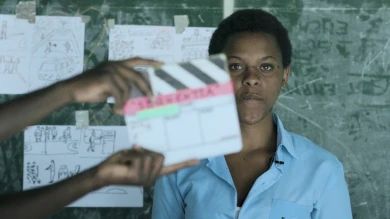
Christian Nyampeta and the École du soir
13, 14, 15 NOV, 11, 12, 13 DIC 2025
Christian Nyampeta is a Rwandan artist, musician and film-maker whose work encompasses pedagogies and community forms of knowledge production and transmission. His Ècole du soir (Evening School) is an art project conceived as a mobile space of collective learning and is named in homage to Ousmane Sembène (1923–2007), a pioneer of African cinema who defined his films as “evening classes” for the people, a medium of education and emancipation through culture.
This block is made up of three double sessions: the video work of Christian Nyampeta, the films of École du soir and one of Ousmane Sèmbene’s feature-length films. Nyampeta will introduce all three first sessions.
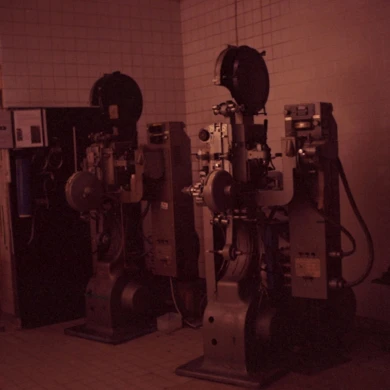
Long Live L’Abo! Celluloid and Activism
4, 5, 6 DIC 2025
L’Abominable is a collective film laboratory founded in La Courneuve (Paris, France) in 1996. It came into being in response to the disappearing infrastructures in artisan film-making and to provide artists and film-makers with a self-managed space from which to produce, develop and screen films in analogue formats such as Super 8, 16mm and 35mm. Anchored in this premise, the community promotes aesthetic and political experimentation in analogue film opposite digital hegemony. Over the years, L’Abominable, better known as L’Abo, has accompanied different generations of film-makers, upholding an international movement of independent film practices.
This third segment is structured in three sessions: a lecture on L’Abo given by Pilar Monsell and Camilo Restrepo; a session of short films in 16mm produced in L’Abo; and the feature-length film Une isle, une nuit, made by the Les Pirates des Lentillères collective.
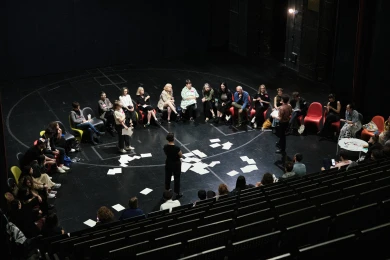
UP/ROOTING
11, 12, 13, 14, 15, 16 NOV 2025
Museo Reina Sofía and MACBA Museu d'Art Contemporani de Barcelona (MACBA) invite applications for the 2025 iteration of the School of Common Knowledge, which will take place from November 11th to 16th in Madrid and Barcelona.
The School of Common Knowledge (SCK) draws on the network, knowledge and experience of L’Internationale, a confederation of museums, art organizations and universities that strives to reimagine and practice internationalism, solidarity and communality within the cultural field. This year, the SCK program focuses on the contested and dynamic notions of rooting and uprooting in the framework of present —colonial, migrant, situated, and ecological— complexities.
Building on the legacy of the Glossary of Common Knowledge and the current European program Museum of the Commons, the SCK invites participants to reflect on the power of language to shape our understanding of art and society through a co-learning methodology. Its ambition is to be both nomadic and situated, looking at specific cultural and geopolitical situations while exploring their relations and interdependencies with the rest of the world.
In the current context fraught with war and genocide, the criminalization of migration and hyper-identitarianism, concepts such as un/belonging become unstable and in need of collective rethinking:
How can we reframe the sense and practice of belonging away from reductive nationalist paradigms or the violence of displacement? How to critically hold the entanglement of the colonial routes and the cultural roots we are part of? What do we do with the toxic legacies we inherit? And with the emancipatory genealogies and practices that we choose to align with? Can a renewed practice of belonging and coalition-making through affinity be part of a process of dis/identification? What geographies —cultural, artistic, political— do these practices of de/centering, up/rooting, un/belonging and dis/alignment designate?
Departing from these questions, the program consists of a series of visits to situated initiatives (including Museo Situado, Paisanaje and MACBA's Kitchen, to name a few), engagements with the exhibitions and projects on view (Project a Black Planet: The Art and Culture from Panafrica), a keynote lecture by Stefano Harney and Fred Moten, as well as daily reading and discussion gatherings, editorial harvest sessions, and conviviality moments.
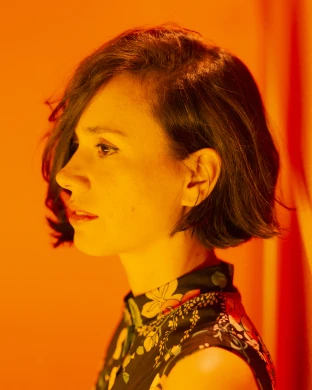
Ylia and Marta Pang
Thursday, 6 November - 8pm
The encounter between Spanish DJ and producer Ylia and visual artist Marta Pang is presented in the form of a premiere in the Museo Reina Sofía. Both artists converge from divergent trajectories to give form to a new project conceived specifically for this series, which aims to create new stage projects by setting out from the friction between artists and dialogue between disciplines.
![Carol Mansour y Muna Khalidi, A State of Passion [Estado de pasión], 2024, película](https://recursos.museoreinasofia.es/styles/small_landscape/public/Actividades/palestine%20cinema%20day%202.jpg.webp)
Palestine Cinema Days
Sábado 1 de noviembre, 2025 – 19:00 h
The Museo Reina Sofia joins the global action in support of Palestine with the screening of A State of Passion (2024), a documentary by Carol Mansour and Muna Khalidi. The film features in Palestine Cinema Days Around the World, an annual festival, held globally every November, which aims to show films made in Palestine to an international audience. The initiative was conceived as a form of cultural resistance which seeks to give a voice to artists from Palestine, question dominant narratives and create networks of solidarity with the Palestinian people.
Palestine Cinema Days Around the World originates from Palestine Cinema Days, a festival organised in Palestine since 2014 with the aim of granting visibility to Palestinian cinema and to support the local film community. In 2023 the festival was postponed because of the war in Gaza, and has since become borderless in scope, holding close to 400 international screenings in almost sixty countries in 2024. This global effort is a show of solidarity with Palestine and broadens the voices and support networks of the Palestinian people around the world.
A State of Passion exposes the atrocities committed against the Gaza population via the testimony of Dr Ghassan Abu Sittah, a Palestinian-British plastic surgeon living in London who decides to return to Gaza and save lives in the city’s hospitals amid the Israeli army’s indiscriminate bombing of the population. A necessary film exposé of the experience of unrelentingly working twenty-four hours a day for forty-three days in the Al Shifa and Al Ahli Hospitals in the city of Gaza.
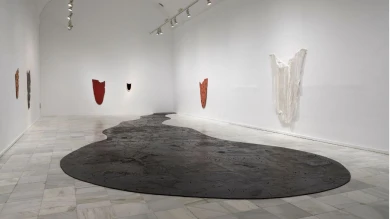
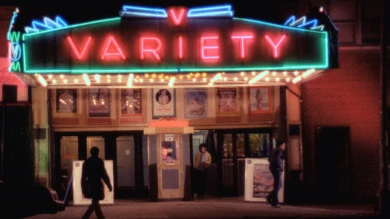
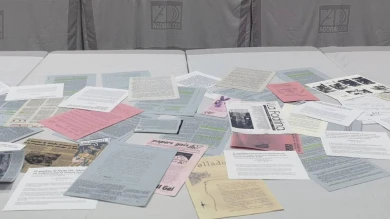
![Miguel Brieva, ilustración de la novela infantil Manuela y los Cakirukos (Reservoir Books, 2022) [izquierda] y Cibeles no conduzcas, 2023 [derecha]. Cortesía del artista](https://recursos.museoreinasofia.es/styles/small_landscape/public/Actividades/ecologias_del_deseo_utopico.jpg.webp)
![Ángel Alonso, Charbon [Carbón], 1964. Museo Reina Sofía](https://recursos.museoreinasofia.es/styles/small_landscape/public/Actividades/perspectivas_ecoambientales.jpg.webp)